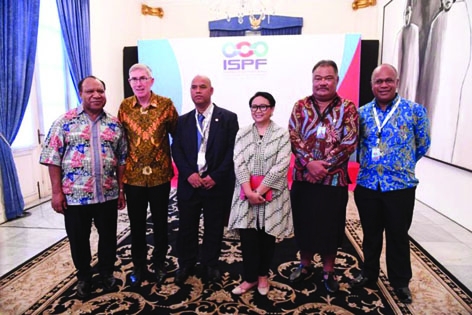In July 2019, at the inaugural Indonesian Exposition held in Auckland, New Zealand, Indonesia launched its ‘Pacific Elevation’, laying claim to a Pacific islands identity and touting its elevated engagement with the region. The event was attended by dignitaries including the foreign ministers of Australia, New Zealand and Indonesia plus representatives from some Pacific island countries. Jakarta also used the occasion to establish diplomatic relations and sign cooperation agreements with the Cook Islands and Niue.
Indonesia’s Foreign Minister, Retno Marsudi described it as “a new era of Pacific partnership. A ‘Pacific Elevation’.” Jakarta used the occasion to peddle its claim that Indonesia is culturally and ethnically linked to the Pacific islands. Marsudi said that she “saw Polynesian and Melanesian faces thatwould not be out of place all over Indonesia.” Indonesia’s Ambassador to New Zealand, Tantowi Yahya, asked those fromPapua, Maluku, and East Nusa Tenggara to stand up as he said to the crowd, “Look at them. They 100 per cent look like you.”
Indonesia is laying claim to a Pacific islands identity by presenting itself as a Pacific island country and therefore asserting a right to be engaged in and influence in the region. But why does Indonesia claim to be a Pacific island country? What does Indonesia’s ‘Pacific Elevation’ mean for the region? Who and what is being elevated? What underlies this relationship? How does Oceania fit into Indonesia’s foreign policy agenda?These are a few of the many questions that Pacific island countries should consider as they engage with Jakarta.
Central to the Pacific Elevation are two issues: trade and
West Papua.
Indonesia’s trade with Pacific island countries is currently worth around A$656 million. Jakarta aims to increase it. In an opinion column in The Jakarta Post on March 21, 2019, which was published at the time of the Indonesia-South Pacific Forum (ISPF) meeting in Jakarta, Marsudi highlighted the negotiations for Preferential Trade Agreements (PTAs) with Papua New Guinea and Fiji. Marsudi says, “The PTAs are expected to transform our similar sociocultural traits,historical traditions and political partnership into concrete economic benefits for the peoples of Indonesia and the South Pacific.”
However, concealed in its claim to a Pacific Islands identity is an issue that has long been a thorn in Indonesia’s sandal, but a gem in its bank account: West Papua.
Jakarta is determined to quell discussions about West Papua amongst Pacific islanders. In the past two decades, there has been an increasing awareness of the human rights abuses and atrocities committed by the Indonesian state against indigenous Melanesian West Papuans since the 1960s. Many Pacific islanders support indigenous West Papuans’ demands for the Indonesian state to be held accountable and for self-determination to be considered. This is even if their governments have different policies or are indifferent to the issue.
So, when the Melanesians were showcased at the Auckland event, what the Indonesian Foreign Minister and Ambassador conveniently glossed over was the fact that West Papuans have been abused and marginalised; their lands have been alienated, and about 500,000 of them have allegedly been murdered by the Indonesian state in the past 50 years.
At the regional level, the Pacific Islands Forum (PIF) walks a tightrope. Since 2000, it has raised concerns about human rights violations, but acknowledges Indonesia’s sovereignty over West Papua.
Discussions about West Papua cause anxiety for the Indonesian Government. In an attempt to strengthen its presence in the region and drown out talks about the issue, Jakarta has inserted itself in regional and sub-regional organisations, becoming a Forum Dialogue Partner in 2001 and an Associate Member of the Melanesian Spearhead Group (MSG) in 2015.
The Pacific Elevation therefore enhances Indonesia’s presence and interests in the region, aims to increase trade and suppresses any support for West Papua’s demands for independence. As icing on the diplomatic cake, in October 2019, Jakarta announced its plan to set aside a A$1 billion endowment fund by 2021, from which A$60 million will beallocated as aid to Pacific island countries annually.
Indonesia’s Pacific Elevation should also be understood within the context of Indonesia’s emergence as a Southeast Asian power with a growing economy, a large population, a sizeable military, and a government determined to make its mark in domestic and international arenas. Under President Joko (“Jokowi”) Widodo, Indonesia’s foreign policy is framed around its Global Maritime Fulcrum (GMF) initiative, which aims to establish the country as a global maritime axis.
This is particularly significant given Indonesia’s location between the Pacific and Indian Oceans, which have become geopolitically important in the wake of the contests for influence between the US and its allies on one hand, and China on the other. Jakarta takes advantage of that rivalry and emerging geopolitical trends such as the Indo-Pacific “to establish sea connectivity, which will bring Indonesia closer to the South Pacific.” As part of this strategy, Jakarta has mapped Oceania into its sphere of influence and elevated its interests. In the process, it hopes to drown out any support for West Papuan independence.
As Pacific island governments embrace Indonesia, there is a need to ask: What/who is being elevated in the Pacific Elevation?
Dr Tarcisius Kabutaulaka is an Associate Professor and
Director of the Center for Pacific Islands Studies at the
University of Hawai‘i at M?noa. The views expressed here are
his personal opinion.
editor@islandsbusiness.com
